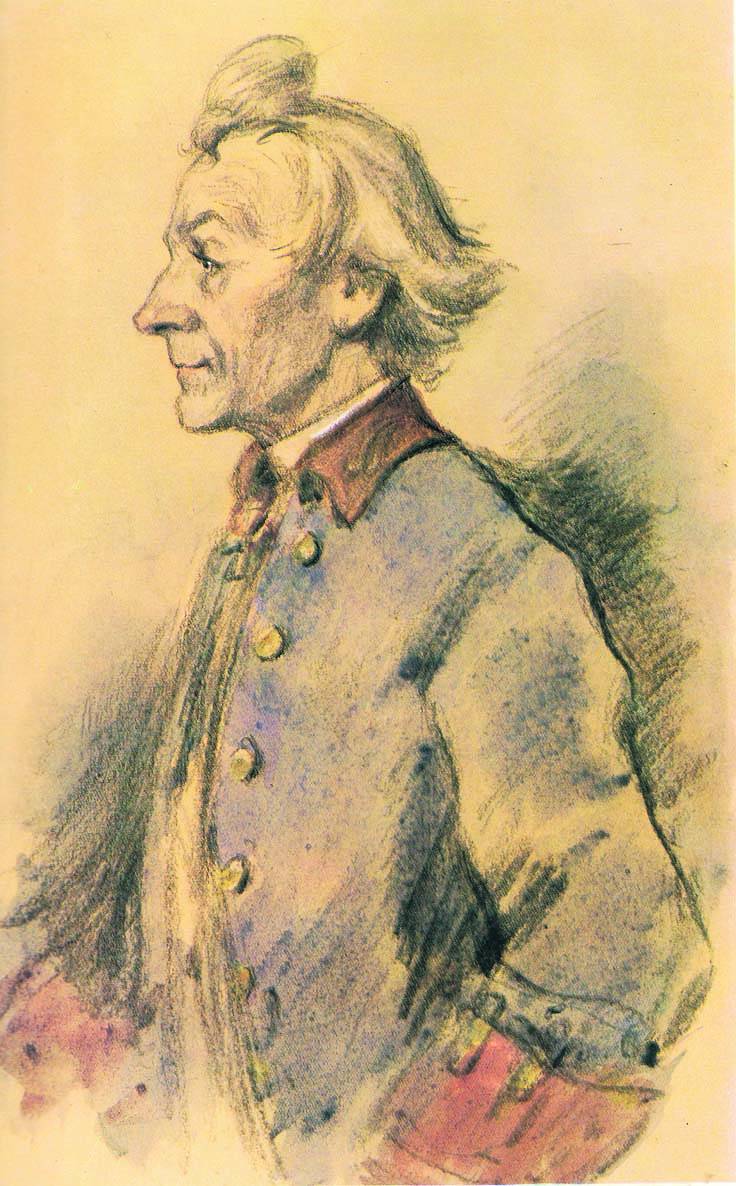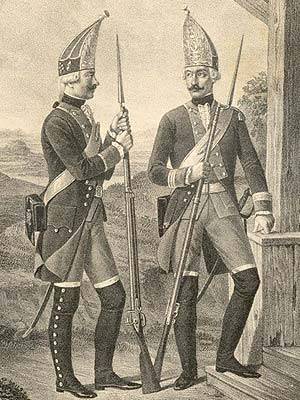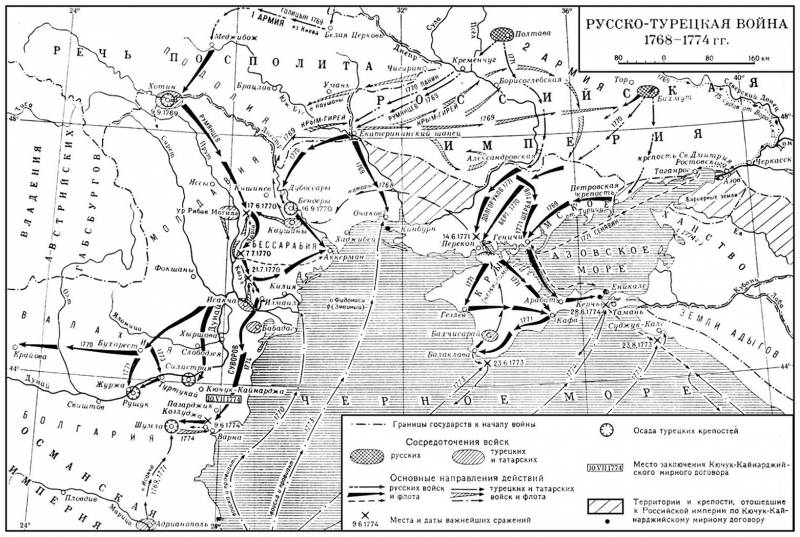Winners are not judged: Suvorov's first triumph over the Turks

A. V. Suvorov. Hood. K. I. Rudakov. 1945 g.
In a conversation with the captured French General Serurier:
With that, he turned and jumped on one leg. Then he added:
Indeed, the great Russian commander was "weird." He loved and appreciated a good joke, he joked himself. He arranged performances in front of the soldiers, crawled like a horse, explaining the tactics of movement. He jumped on the fence and shouted:
So he woke the sleeping officers. He loved to play with children, ride a swing or slide down a slide on a sled. That is, he did not behave like a rich gentleman or a famous commander, or one of the largest nobles of the Russian Empire.
He loved to change into a soldier's uniform and was very happy when he was not recognized. Once a sergeant, sent to the commander with a report, addressed him as if he were a soldier:
Suvorov fled from the angry soldier. Soon he returned to headquarters and saw this de sergeant there. He recognized the "soldier" and began to ask for forgiveness. And Suvorov says to this:
And he presented this soldier with a glass of vodka.
Danube
After the Polish campaign, Alexander Suvorov was sent to the Swedish border, where he was engaged in the inspection and strengthening of fortresses. Meanwhile, Russia was at war with Turkey. The Russian army at the Danube theater was commanded by Pyotr Rumyantsev. The Turkish army was defeated in the war. Russian troops occupied the Wallachian and Moldavian principalities, Crimea.
In the spring of 1772, Rumyantsev and the Grand Vizier Mehmed Pasha agreed on an armistice. Almost all of 1772 and the beginning of 1773, peace negotiations took place in Focsani and Bucharest. However, the Turks did not agree to the main demand of St. Petersburg - the recognition of the independence of the Crimea from the Port. In the spring of 1773, hostilities resumed. The government demanded decisive action and an offensive across the Danube. Rumyantsev asked to strengthen the army.
On April 4, 1773, Suvorov was assigned to the active army, which he had asked for for two years. He arrived in Iasi before the highest order for his appointment arrived there by courier. Rumyantsev greeted the general coldly. He knew very well that decisive action was expected from him in the capital. Suvorov (after the battles) was the personification of determination and initiative. He believed that a lot can be achieved with small forces. Rumyantsev appointed him to the 2nd division of Saltykov, whose headquarters were located in Bucharest.
On May 4, Suvorov was in Bucharest and received a small detachment (about 2 thousand people) at the Negoesti monastery, 10 miles from the Danube. That is, he, the hero of the war in Poland, was given the role of a simple colonel. In fact, they were sent to the most advanced positions of the army, but with such small forces that Alexander Suvorov could not do anything serious.
However, Suvorov did not lose heart. On the right bank of the Danube (opposite the Oltenitz) there was an enemy fortress Turtukay. The Turkish garrison numbered 4 thousand people. The Russian general was entrusted with the search for Turtukai (reconnaissance), so that in time Rumyantsev could launch an offensive with the main forces.
"Turtukay is taken, and I am there!"
On May 6 (17), 1773, Suvorov arrived in Negoesti. The Astrakhan infantry, Astrakhan carabiner and Cossack regiments were located here. The infantry (Astrakhan) had been familiar to the Major General since 1762, when he temporarily commanded a regiment with the rank of colonel. The general immediately began to teach the soldiers to fight: instead of reviews and marches with the Prussian lines, ꟷ turns and entry, shooting, bayonet attacks and through attacks. Only attack, only assault. Suvorov taught that the soldiers did not take a step back, learn to attack.
On the Ardzhisha River, which flows into the Danube, Suvorov gathered boats to cross the Danube. He appointed experienced rowers from Astrakhan. Then he conducted personal reconnaissance. The right bank of the Danube, occupied by the enemy, was high. The Turks guarded the mouth of the Ardzhishi river, they could fire it from guns. Therefore, the Russian commander decided to cross three versts downstream of the Danube and transported boats there on carts.
There were few people. For reconnaissance in force, Suvorov could only allocate 500 infantry. He asked Saltykov for reinforcements, but he sent only three squadrons of carabinieri, although infantry was needed.
The Turks were ahead of the Russians, they were the first to do reconnaissance. Their cavalry crossed the Danube and tried to make a surprise attack on the Negoesti detachment. However, Suvorov did not sleep. The Cossacks discovered the enemy in time and themselves suddenly launched a flank attack. Dozens of Ottomans were hacked to death, the remnants of the detachment fled across the river. Suvorov decided not to wait (until the enemy comes to his senses from defeat) and immediately pay a return visit.
The operation was scheduled for the night of May 10 (21). The boats quickly moved towards the opposite bank. Soon, the enemy pickets found the Russians and opened fire on them. Then the Turkish battery also opened fire. Russian guns answered from their bank. The Turks tried to stop the landing, but to no avail: they fired in the dark, from a long distance, and never showed good accuracy.
The Astrakhanians successfully landed and lined up in two squares under the command of Colonel Baturin and Lieutenant Colonel Maurinov. Riflemen scattered ahead, reserve behind the main forces. The Russians immediately overturned the enemy post. The Turks fled to their camps in front of the fortress.
Suvorov divided the detachment: Maurinov's column moved to the left flank towards the pasha's camp, in front of which was a battery, and he himself with Baturin's column went along the coast to enter the enemy's flank. The Turks opened fire from the battery. The Astrakhanians bravely withstood the shelling and went into the bayonet. They broke into the battery and killed the enemies. One cannon exploded. The general himself was wounded in the leg.
The Turks fled in panic, their resistance sharply weakened. As a result, the miraculous heroes of Suvorov captured three enemy camps and a fortress during a three-hour battle. Seven hundred Russians defeated four thousand Turks. Our losses - about 200 people, enemy - 1-1,5 thousand people only killed.
The remnants of the Turkish garrison fled to Shumla and Ruschuk. Our troops captured 6 flags, 16 cannons (the heaviest ones were sunk) and 51 ships. The Turtukay fortress was destroyed. All Christians were taken out of the city for resettlement to the Russian side.
Suvorov wrote two reports. Saltykov:
And to Count Rumyantsev:
There is a version that the unauthorized operation of Suvorov angered the command, and he received a reprimand. And among the soldiers of Suvorov, a legend was born in general that a military court sentenced him to demotion to soldiers and death. But Empress Catherine II canceled the punishment:
While the trial is still in progress, the Turks again fortified Turtukai. Rumyantsev ordered a second search. On June 17 (28), he again took the enemy fortress, despite the numerical superiority of the enemy (2 thousand Russians against 4 thousand Turks). For these successes, the Major General was awarded the Order of St. George 2nd degree.

Corporal and sergeant of the grenadier company of the infantry regiment. 1763ꟷ1786
Defense of Girsovo
Rumyantsev transferred Suvorov to the reserve corps, and then as commandant in Girsovo. It is a city occupied by the Russians on the right bank of the Danube. Rumyantsev's army during the offensive defeated the enemy's field army in all battles. But she could not build on her success and take Silistria. Rumyantsev withdrew his troops across the Danube. The commander-in-chief justified himself by a lack of forces and supply problems.
The Turks organized a counteroffensive, one of the strikes was directed at Girsovo. On the night of September 3 (14), 1773, the 10-thousandth Turkish corps (4 thousand infantry and 6 thousand cavalry) appeared at Girsovo. In the morning the Turks approached the fortress for a cannon shot and waited for the approach of all forces.
Suvorov had 3 thousand people. True to his tactics, the Russian commander intended to wait for the full concentration of all the enemy's forces and settle the matter with one crushing blow. The Ottomans, trained by French advisers, formed in three lines, with cavalry on the flanks.
To give the enemy courage, Suvorov sent the Cossacks to attack, ordered them to turn to feigned flight after the firefight. The Cossacks did just that. The Turks finally became bolder, set up batteries and opened fire on the forward Russian field fortification - the trench. The Russian guns did not respond. Deceived by this, believing that the enemy was weak and frightened, the Turks rushed into a decisive attack. They were greeted with buckshot, rifle volleys. The field was littered with dead and wounded.
Suvorov led his soldiers out of the field fortification and struck with bayonets. The brigade of Andrei Miloradovich (father of Suvorov's associate in Italy, the future hero of the Patriotic War of 1812) struck the enemy's right flank. And the Russian cavalry was in the center, where the enemy infantry was. Unable to withstand the powerful onslaught, the Ottomans fled. Our cavalry pursued the enemy until the horses were completely exhausted. Our losses ꟷ about 200 people, Turkish ꟷ from 1 to 2 thousand people only killed. The Russians captured all the guns and the train. Rumyantsev thanked Suvorov for the victory.
Kozludzhi
Both armies retreated to winter quarters. Suvorov received leave and left for Moscow, to his father. Vasily Suvorov insisted on getting married. In January 1774, Alexander Vasilyevich married Princess Varvara Ivanovna, daughter of Prince Ivan Andreevich Prozorovsky and his wife Maria Mikhailovna (from the Golitsyn family). The marriage did not work out. Varvara was spoiled, did not accept the simple life of her husband. Apparently, she cheated on her constantly absent husband. As a result, Suvorov broke off relations with his wife.
In the spring of 1774, Alexander Suvorov was promoted to lieutenant general and returned to the active army. Rumyantsev planned to develop an offensive against Shumla and occupy the territory from the Danube to the Balkans. The offensive was led by Kamensky's 3rd division and Suvorov's reserve corps. A total of about 24 thousand bayonets and sabers.
Kamensky's troops crossed the Danube in April, took Karasu in May, and Bazardzhik in June. Kamensky went to Shumla. Suvorov ꟷ from Girsovo and went to Bazardzhik, where he joined with Kamensky. Meanwhile, the 40-strong Turkish army under the command of Haji-Abdzl-Rezak took a position at Kozludzhi, closing the way to Shumla.
On June 9 (20), 1774, the battle of Kozludja took place. On the way to Kozludzha, Suvorov met a strong detachment of Turkish cavalry, he hastily retreated. The Russian cavalry pursued the enemy, emerged from a close forest defile (a narrow passage in a hard-to-reach place) into an open plain and then ran into a large enemy force. The Ottomans tried to cut off and destroy our cavalry. The Cossacks, who were in the vanguard, quickly retreated.
Infantry was brought forward to help our cavalry. The Russian cavalry successfully retreated, and the enemy was met by infantry. Before the formidable wall of Russian bayonets, the enemy turned back. In the narrow forest road, the Russians and Turks could use only insignificant forces. In the Russian vanguard there were two battalions of rangers and one battalion of grenadiers. Then the advance detachment was reinforced with another battalion of rangers. They were personally commanded by Suvorov.
Alexander Suvorov led the troops on the offensive. Coming out of the defile, he repulsed several enemy attacks. Then the artillery approached. For three hours our batteries smashed enemy positions. Suvorov again went to their assault and captured the heights. The cavalry (due to the very rough terrain) could not get around the enemy. The Turks were able to retreat to the camp near Kozludzha.
Suvorov pulled up the guns again and opened fire. The Ottomans fell into panic, abandoning their guns, baggage train and all property, and fled. 107 banners and 29 guns were captured. The Turkish army lost up to 3 thousand people, the Russian - more than 200 people.
Suvorov's actions led to the victory of the Russian army. However, Kamensky presented everything in such a way that the honor of Victoria belongs to him. Alexander Vasilyevich suggested immediately (until the enemy woke up) to go to Shumla. But Kamensky did not support this idea.
The victory at Kozludja became the crown not only of the campaign of 1774, but of the entire war. The Ottomans were demoralized and could no longer continue the war.
In July 1774, the Kuchuk-Kainardzhiyskiy Peace Treaty was signed.

Information